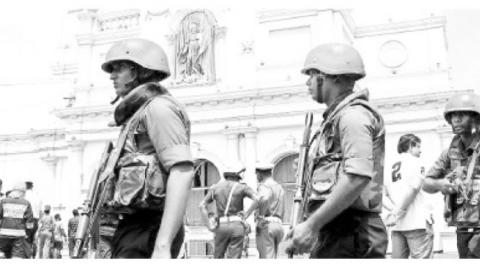The terrorist attacks on Catholic churches and other sites in Colombo, on 21 April 2019, demonstrated that Sri Lanka is part of a global world. The terrorists were motivated and supported by the Islamic State terror group in the Middle East. The immediate motivation for the incident was the terrorist attack on mosques in Christchurch, New Zealand, on 15 March 2019. India had given the Sri Lankan Government advance warning of a detailed terrorist plan. Aside from the loss of life, Sri Lanka may also suffer economic damage in terms of reduced tourism from foreign countries. Thus, Sri Lanka must attend to international affairs in order to attend to its own domestic affairs, because both are unavoidably connected.
This connection between domestic and international affairs could in fact transform a crisis for Sri Lanka into an opportunity. The terrorist attacks provoked outrage around the world, including in Japan and India. But because the attacks targeted Christians, people in the United States, Europe, and other parts of the world wished to show strong support for Sri Lanka. As one example, on 5 May, I attended an Interfaith Service of Prayer and Remembrance for the People of Sri Lanka at Washington National Cathedral in Washington, D.C.
In the aftermath of the terrorist attack, and in light of international developments, the time is right for Sri Lanka to turn to Europe for increased support. European countries have started to focus on the Indo-Pacific region. In May 2019, India and France are holding their biggest joint exercises to date in the Indian Ocean, with aircraft carriers from both Nations participating. Also expanding its presence in the Indo-Pacific is the United Kingdom, which is planning to dispatch an aircraft carrier, HMS Queen Elizabeth, to the Pacific by way of the Indian Ocean in 2021. The UK is suggesting that India build the same type of aircraft carrier, in its own shipyards, for the Indian Navy.
The role of Europe in the Indo-Pacific is a subject of new attention, including in the United States. Recently, the Hudson Institute in Washington, D.C., held public events on the topic of Europe’s Expanding Role in the Indo-Pacific, with officials and experts offering information and their perspectives. The takeaway from these events is that there are three main factors pushing European countries to return to the Indo-Pacific. All three concern recent stances and actions taken by China in the realm of foreign relations.
Foreign investment
First, China has been using foreign investment to win favour in certain European countries. In 2016, for example, a European Union statement criticising China’s human rights record at the United Nations was blocked by Greece, a recipient of huge Chinese investment. China has also invested heavily in several EU members in Eastern Europe, prompting the EU to worry about those Nations’ ability to act independently of China’s demands. Sri Lanka faced such a problem when China demanded a ninety nine-year lease of Hambantota Port.
Second, China has ignored a judgment by an international tribunal in The Hague rejecting China’s right to build artificial islands in the South China Sea. Moreover, despite its claim that these islands are not being built for military purposes, China has started to deploy armaments on the islands. As a result, European countries view China as challenging the values that Europe has cultivated. If China’s influence in the rising Indo-Pacific region increases without European involvement, Europe worries that the region will come to be ruled by China’s values.
Third, escalating tensions between the United States and China have reminded many European countries that they are US allies. This alliance shapes the way European countries carry out their military roles.
Despite the geographical distance between Europe and the Indo-Pacific, enhanced European engagement in the region will be sustained, unless the situation changes drastically in the short-term.
How is this European engagement being received in Asia? As mentioned above, India has been cooperating with Europe, and Japan has welcomed European efforts. Shinzo Abe first mentioned the role of the UK and France in cooperative efforts among Japan, the United States, India, and Australia in his 2012 article ‘Asia’s Democratic Security Diamond,’ which was published two days before he was sworn in as Prime Minister. Currently, Japan’s Defence Ministry is maintaining high-level dialogue and consultation with the UK, France, and Germany. Japan has also maintained similar cooperation with Canada, a North Atlantic Treaty Organisation (NATO) member.
Today, Sri Lanka needs to strengthen its anti-terror measures. But it needs to do so in a careful manner. The investigation of the 21 April attack, conducted by Sri Lankan authorities with the assistance of US specialists, resulted, coincidentally, in the arrest of retired Major General Kapila Hendawitharana, a former Director of Military Intelligence, when it was found that he was an agent of China. The lesson is that, even if China supports Sri Lanka’s efforts against terrorism, Sri Lanka is better off relying on its partners in Europe, the United States, Japan, India, and Australia. Now is the time to enhance Sri Lanka’s cooperation with these countries.


















